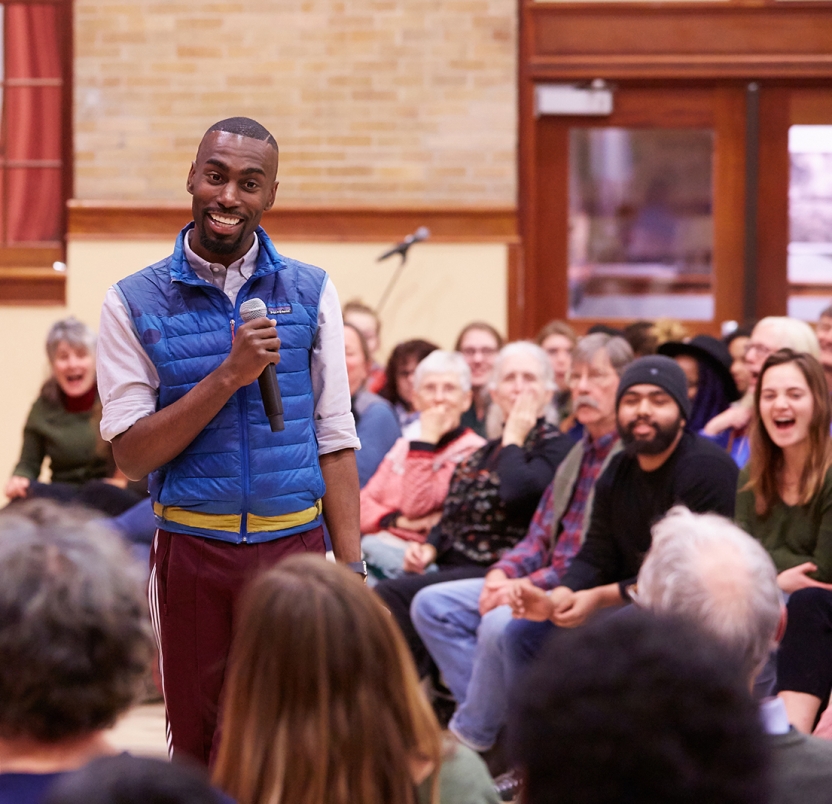Author, Organizer DeRay Mckesson Speaks About the State of Activism in the U.S.

MIDDLEBURY, Vt. – “We live and plan in the real world, not the abstract.”
That was among the messages that organizer and author DeRay Mckesson shared at Middlebury College on November 7, just a day after the 2018 midterm elections. Mckesson was at Middlebury to share lessons and reflections from the front lines of civil rights activism—and on this particular evening, as the political landscape continued to shift, the lessons were especially sharp.
“There are a lot of people who organize in the abstract,” said Mckesson. But there’s nothing abstract about names on the ballot, and the ultimate responsibility to make a choice that sometimes is one of life or death. “Sometimes we just have to make a choice, and it’s not beautiful but we just have to make it,” he said, reflecting on the 2016 election. “We’re always trying to set the scene so that the choices we make in the future are better than the choices we make today.”
Mckesson, 33, is a civil rights advocate, Black Lives Matter leader, community organizer, and podcaster. He graduated from Bowdoin College in 2007 and stepped onto the national stage in 2014 after leaving his job in a Minnesota school district to join the protests that erupted in Ferguson, Missouri, following the death of teenager Michael Brown at the hands of police.
“I didn’t know many things, but I knew that Mike Brown should be alive today,” said Mckesson. “That was my guiding star.”
So he began spending every chance he could in Ferguson, ultimately quitting his job—giving up his apartment, his health care, and his paycheck—to protest full time. Mckesson gained national prominence for his from-the-streets updates and activism on Twitter and Instagram. Along with fellow activists Johnetta Elzie, Brittany Packnett, and Samuel Sinyangwe, Mckesson launched Campaign Zero, a policy platform to end police violence. He’s written for HuffPost and the Guardian, and currently hosts the podcast Pod Save the People. Mckesson’s first book, The Other Side of Freedom: The Case for Hope, hit shelves in early September.
Mckesson’s presentation was a partnership between the Vermont Humanities Council’s First Wednesdays series and Middlebury’s Engaged Listening project.
“DeRay’s story is one that teaches us to use the platforms that we already have,” said Student Government Association President Nia Robinson in her introductory remarks. “In a time when we constantly ask what to do and how to do it, he encourages us to look around.”
During his at-capacity talk, Mckesson said early on that if we are to talk about what “the other side of freedom” looks like, we need to acknowledge what’s on this side today. What that means is acknowledging and naming injustices in today’s America: the fact that we arrest more people for weed than for all violent crimes combined; that in many states stealing a handbag worth $300 can earn someone the lifelong label of a felon; and that one in 11 gun homicides in California is at the hands of police.
At Middlebury, Mckesson appeared in his trademark blue Patagonia vest (so ever present and recognizable that the vest has its own Twitter account, and earned a shout out in Vogue earlier this year). He spent the majority of his time speaking about the ideas with which he’s currently “obsessed,” primarily guiding principles for better, more effective community activism. He stressed the importance of creating multiple “entrances and on ramps” for individuals, forsaking self-righteousness about any one way to be an activist in favor of welcoming more people into the fold.
But Mckesson also advocates being tough when necessary. He’s more interested in preaching to the choir than extending a hand to opponents, and stressed the importance of sharing the cognitive burden with those who oppose activists. That means not assuming complete responsibility for educating others, instead asking the right questions of those who might stand on an opposing side of the issue. And Mckesson is well acquainted with his opponents; he’s been the target of death threats and seemingly unending streams of racist vitriol.
“People ask me what I’m doing to reach across the aisle, and I’m not reaching,” he said. He doesn’t just want to preach to the choir; he wants to build a bigger choir. If you’ve ever participated in a choir, he said, you’ll know that there’s nothing passive about the experience. “You figure out how to use your voice in ways you didn’t know how to use it before,” he said.
Mckesson’s lecture was followed by interactive small group conversations in the packed Wilson Hall, and ended with a question-and-answer period in which students asked Mckesson about finding their way as activists, teaching children about social justice, and the sacrifices he’s made to be on the front lines of modern civil rights activism.
Mckesson acknowledged that he has, in fact, sacrificed a lot in the last four years. But it’s not without hope, or optimism that the sacrifice will have been worthwhile.
“I really do think we can win,” Mckesson told the crowd. “I believe that I’ll be 70 and look back and say, ‘That was really hard, but we did it.’”
By Kathryn Flagg ’08; Photo by Todd Balfour

